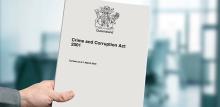Date published
09 August 2019
|
Last modified
26 October 2022
|
Last reviewed
26 October 2022
Purpose of an investigation
The purpose of a corruption investigation is to:
- Determine whether people should be charged with criminal offences or face disciplinary action within their agency.
- Clear a person’s name, if no evidence has been found to support allegations made against them, particularly where the matter has been made public
- Identify vulnerabilities and gaps in agency policies or systems, and advise agencies about possible corruption risks and recommend solutions to address them.
Investigative powers
The Crime and Corruption Act 2001 and the Police Powers and Responsibilities Act 2000 provide the CCC and our seconded police officers with special powers to investigate allegations of corruption.
These include search, surveillance and seizure powers, and the power to conduct hearings that compel people to attend and give evidence and produce documents and other material.
The CCC may conduct joint investigations with agencies, using CCC powers and in-house expertise in intelligence, financial analysis and forensic computing.
Read more about our powers.
To provide feedback on this page's content, please contact us.

